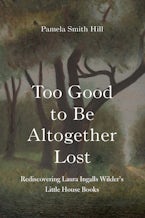“In her third major study of Laura Ingalls Wilder’s work, Pamela Smith Hill distinguishes herself as the preeminent Wilder scholar of this generation. Eminently readable, meticulously researched, without catering to passion or prejudice, Too Good to Be Altogether Lost places Wilder and the Little House books firmly in the pantheon of American literature.”-Eric A. Kimmel, winner of the Sydney Taylor Award for Lifetime Achievement and the Regina Medal
“Pamela Smith Hill’s Too Good to Be Altogether Lost offers an important next step in ongoing conversations and controversies surrounding Laura Ingalls Wilder’s work. Through her close and thoughtful readings and intimate knowledge of Wilder’s life, process, and writing, Hill suggests new and useful perspectives on her groundbreaking books, their place in history, their literary merits, and their relationship to historical attitudes about race, gender, and manifest destiny. And Hill breaks new ground herself in her chapter on The First Four Years with a startling hypothesis about the writing of the novel long presented as the final installment in the Little House series. Wilder fans and scholars alike should prepare to have their minds blown by Hill’s intriguing and thoroughly researched take on this work. Through her reconsideration, Hill demonstrates that even works that have become entrenched in our imaginations can yield new discoveries, and how despite perceived flaws and changing times, these books are too good to be altogether lost.”-Nancy McCabe, author of From Little Houses to Little Women: Revisiting a Literary Childhood
“With the voluminous scholarship concerning Laura Ingalls Wilder’s life and literary output can there be a need for a fresh and expanded assessment of the author’s writings? In author Pamela Smith Hill’s Too Good to be Altogether Lost the answer is a resounding ‘yes.’ As one of Wilder’s chief biographers, with a near-lifetime of researching, teaching, and writing about the author of the Little House books Hill proves that there is more to say about the creation of the books and how they resonate in current American culture. . . . . With impeccable sources and wise analysis, [Hill] tackles with panache the endlessly fascinating tale of the Little House writing collaboration between Wilder and her daughter Rose Wilder Lane. Hill also creates a case for the Little House canon as a valid source for future reading, assessment, and appreciation. This is a welcome and recommended book indeed.”-William Anderson, editor of The Selected Letters of Laura Ingalls Wilder

